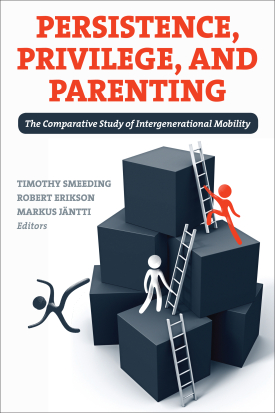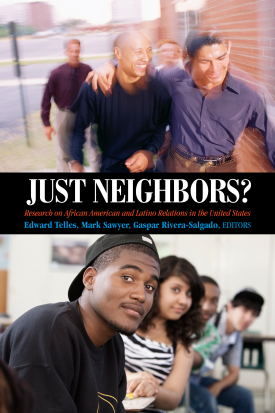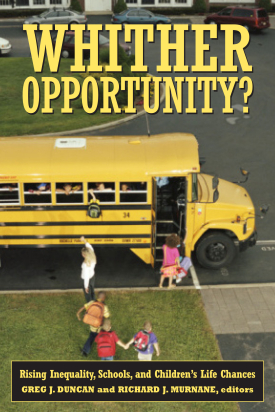In the past two decades, the U.S. has seen a notable increase in the numbers of new immigrants from Latin America moving away from traditional gateway areas to new immigrant destinations in the south and Midwest, as well as to suburbs and small towns around traditional gateway cities. These new locales have little or no previous experience with immigration and lack the institutional infrastructure to help immigrants integrate. As a result, they often struggle to create new policies in response to these rapid changes.
Surveys of public opinion suggest support for government action on behalf of the unemployed typically grows during market turbulence. In the 50 years after World War II, popular support for government spending on the social safety net typically increased during recessions. But the Great Recession may be different. Tea Party groups have emerged to oppose social spending and fiscal deficits, and support for income transfer policies among the American public as a whole went slightly down between 2008 and 2010.
The Great Recession has had a significant and largely negative impact on Americans and their families in a variety of ways. Millions of Americans have experienced the loss of their homes through foreclosure. Significant numbers are behind on rent or mortgage payments, or are “underwater,” paying on homes that are worth less than is owed. More than 14 million Americans are still without work, another 11.3 million are underemployed, and 6.3 million have been unemployed for more than six months.

Persistence, Privilege, and Parenting
About This Book
Americans like to believe that theirs is the land of opportunity, but the hard facts are that children born into poor families in the United States tend to stay poor and children born into wealthy families generally stay rich. Other countries have shown more success at lessening the effects of inequality on mobility—possibly by making public investments in education, health, and family well-being that offset the private advantages of the wealthy. What can the United States learn from these other countries about how to provide children from disadvantaged backgrounds an equal chance in life? Making comparisons across ten countries, Persistence, Privilege, and Parenting brings together a team of eminent international scholars to examine why advantage and disadvantage persist across generations. The book sheds light on how the social and economic mobility of children differs within and across countries and the impact private family resources, public policies, and social institutions may have on mobility.
In what ways do parents pass advantage or disadvantage on to their children? Persistence, Privilege, and Parenting is an expansive exploration of the relationship between parental socioeconomic status and background and the outcomes of their grown children. The authors also address the impact of education and parental financial assistance on mobility. Contributors Miles Corak, Lori Curtis, and Shelley Phipps look at how family economic background influences the outcomes of adult children in the United States and Canada. They find that, despite many cultural similarities between the two countries, Canada has three times the rate of intergenerational mobility as the United States—possibly because Canada makes more public investments in its labor market, health care, and family programs. Jo Blanden and her colleagues explore a number of factors affecting how advantage is transmitted between parents and children in the United States and the United Kingdom, including education, occupation, marriage, and health. They find that despite the two nations having similar rates of intergenerational mobility and social inequality, lack of educational opportunity plays a greater role in limiting U.S. mobility, while the United Kingdom’s deeply rooted social class structure makes it difficult for the disadvantaged to transcend their circumstances. Jane Waldfogel and Elizabeth Washbrook examine cognitive and behavioral school readiness across income groups and find that pre-school age children in both the United States and Britain show substantial income-related gaps in school readiness—driven in part by poorly developed parenting skills among overburdened, low-income families. The authors suggest that the most encouraging policies focus on both school and home interventions, including such measures as increases in federal funding for Head Start programs in the United States, raising pre-school staff qualifications in Britain, and parenting programs in both countries.
A significant step forward in the study of intergenerational mobility, Persistence, Privilege, and Parenting demonstrates that the transmission of advantage or disadvantage from one generation to the next varies widely from country to country. This striking finding is a particular cause for concern in the United States, where the persistence of disadvantage remains stubbornly high. But, it provides a reason to hope that by better understanding mobility across the generations abroad, we can find ways to do better at home.
TIMOTHY M. SMEEDING is director of the Institute for Research on Poverty and Distinguished Professor of Public Affairs at the University of Wisconsin–Madison.
ROBERT ERIKSON is professor of sociology at the Swedish Institute for Social Research, Stockholm University.
MARKUS JANTTI is professor of economics at the Swedish Institute for Social Research, Stockholm University.
CONTRIBUTORS: Jo Blanden, Miles Corak, Lori J. Curtis, Matthew Di Carlo, Greg J. Duncan, Robert Erikson, John Ermisch, Gøsta Epsing-Andersen, David B. Grusky, Robert Haveman, Markus Jäntti, John Jerrim, Jan O. Jonsson, Ariel Kalil, Bertrand Maître, John Micklewright, Carina Mood, Brian Nolan, Fabian T. Pfeffer, Shelley Phipps, Reinhard Pollak, Chiara Pronzato, Timothy M. Smeeding, James P. Smith, Kjetil Telle, Sander Wagner, Jane Waldfogel, Elizabeth Washbrook, Christopher T. Whelan, Kathryn Wilson, Kathleen M. Ziol-Guest, Julie M. Zissimopoulos
RSF Journal
View Book Series
Sign Up For Our Mailing List
Apply For Funding

Just Neighbors?
About This Book
Blacks and Latinos have transformed the American city—together these groups now constitute the majority in seven of the ten largest cities. Large-scale immigration from Latin America has been changing U.S. racial dynamics for decades, and Latino migration to new destinations is changing the face of the American south. Yet most of what social science has helped us to understand about these groups has been observed primarily in relation to whites—not each other. Just Neighbors? challenges the traditional black/white paradigm of American race relations by examining African Americans and Latinos as they relate to each other in the labor market, the public sphere, neighborhoods, and schools. The book shows the influence of race, class, and received stereotypes on black-Latino social interactions and offers insight on how finding common ground may benefit both groups.
From the labor market and political coalitions to community organizing, street culture, and interpersonal encounters, Just Neighbors? analyzes a spectrum of Latino-African American social relations to understand when and how these groups cooperate or compete. Contributor Frank Bean and his co-authors show how the widely held belief that Mexican immigration weakens job prospects for native-born black workers is largely unfounded—especially as these groups are rarely in direct competition for jobs. Michael Jones-Correa finds that Latino integration beyond the traditional gateway cities promotes seemingly contradictory feelings: a sense of connectedness between the native minority and the newcomers but also perceptions of competition. Mark Sawyer explores the possibilities for social and political cooperation between the two groups in Los Angeles and finds that lingering stereotypes among both groups, as well as negative attitudes among blacks about immigration, remain powerful but potentially surmountable forces in group relations. Regina Freer and Claudia Sandoval examine how racial and ethnic identity impacts coalition building between Latino and black youth and find that racial pride and a sense of linked fate encourages openness to working across racial lines.
Black and Latino populations have become a majority in the largest U.S. cities, yet their combined demographic dominance has not abated both groups’ social and economic disadvantage in comparison to whites. Just Neighbors? lays a much-needed foundation for studying social relations between minority groups. This trailblazing book shows that, neither natural allies nor natural adversaries, Latinos and African Americans have a profound potential for coalition-building and mutual cooperation. They may well be stronger together rather than apart.
EDWARD TELLES is professor of sociology at Princeton University and vice president of the American Sociological Association.
MARK Q. SAWYER is associate professor of African American studies and political science at the University of California, Los Angeles, and is also director of the Center for the Study of Race, Ethnicity and Politics.
GASPAR RIVERA-SALGADO is project director at the UCLA Center for Labor Research and Education.
CONTRIBUTORS: James D. Bachmeier, Matt A. Barreto, Frand D. Bean, Susan K. Brown, Jessica Johnson Carew, Niambi Carter, Regina M. Freer, Michael Jones-Correa, Gerald F. Lackey, Claudia Sandoval Lopez, Monique L. Lyle, Cid Martinez, Paula D. McClain, Monica McDermott, Tatcho Mindiola Jr., Jason L. Morin, Tatishe M. Nteta, Shayla C. Nunnally, Efren O. Perez, Victor M. Rios, Nestor Rodriquez, Gabriel R. Sanchez, Candis Watts, Rosaura Tafoya-Estrada, James Diego Vgil, Kevin Wallsten, Eugene Walton Jr., Sylvia Zamora.
RSF Journal
View Book Series
Sign Up For Our Mailing List
Apply For Funding

Whither Opportunity?
About This Book
As the incomes of affluent and poor families have diverged over the past three decades, so too has the educational performance of their children. But how exactly do the forces of rising inequality affect the educational attainment and life chances of low-income children? In Whither Opportunity? a distinguished team of economists, sociologists, and experts in social and education policy examines the corrosive effects of unequal family resources, disadvantaged neighborhoods, insecure labor markets, and worsening school conditions on K-12 education. This groundbreaking book illuminates the ways rising inequality is undermining one of the most important goals of public education—the ability of schools to provide children with an equal chance at academic and economic success.
The most ambitious study of educational inequality to date, Whither Opportunity? analyzes how social and economic conditions surrounding schools affect school performance and children’s educational achievement. The book shows that from earliest childhood, parental investments in children’s learning affect reading, math, and other attainments later in life. Contributor Meredith Phillip finds that between birth and age six, wealthier children will have spent as many as 1,300 more hours than poor children on child enrichment activities such as music lessons, travel, and summer camp. Greg Duncan, George Farkas, and Katherine Magnuson demonstrate that a child from a poor family is two to four times as likely as a child from an affluent family to have classmates with low skills and behavior problems – attributes which have a negative effect on the learning of their fellow students. As a result of such disparities, contributor Sean Reardon finds that the gap between rich and poor children’s math and reading achievement scores is now much larger than it was fifty years ago. And such income-based gaps persist across the school years, as Martha Bailey and Sue Dynarski document in their chapter on the growing income-based gap in college completion.
Whither Opportunity? also reveals the profound impact of environmental factors on children’s educational progress and schools’ functioning. Elizabeth Ananat, Anna Gassman-Pines, and Christina Gibson-Davis show that local job losses such as those caused by plant closings can lower the test scores of students with low socioeconomic status, even students whose parents have not lost their jobs. They find that community-wide stress is most likely the culprit. Analyzing the math achievement of elementary school children, Stephen Raudenbush, Marshall Jean, and Emily Art find that students learn less if they attend schools with high student turnover during the school year – a common occurrence in poor schools. And David Kirk and Robert Sampson show that teacher commitment, parental involvement, and student achievement in schools in high-crime neighborhoods all tend to be low.
For generations of Americans, public education provided the springboard to upward mobility. This pioneering volume casts a stark light on the ways rising inequality may now be compromising schools’ functioning, and with it the promise of equal opportunity in America.
GREG J. DUNCAN is distinguished professor in the Department of Education at the University of California, Irvine.
RICHARD J. MURNANE is Thompson Professor of Education and Society at the Harvard Graduate School of Education.
CONTRIBUTORS: Joseph G. Altonji, Elizabeth O. Ananat, Emily Art, Martha J. Bailey, Don Boyd, Harry Brighouse, Julia Burdick-Will, Vilsa E. Curto, Susan M. Dynarski, George Farkas, Roland G. Fryer Jr., Frank F. Furstenberg, Anna Gassman-Pines, Lisa Gannetian, Christina M. Gibson-Davis, David Harding, Michael Hout, Meghan L. Howerd, Brian A. Jacob, Alexander Janus, Marshall Jean, Neeraj Kaushal, David S. Kirk, Jeffrey Kling, Hamp Lankford, Phillip B. Levine, Tamara Wilder Linkow, Susanna Loeb, Jens Ludwig, Katherine Magnuson, Richard K. Mansfield, Charles A. Nelson III, Meredith Phillips, Stephen W. Raudenbush, Sean F. Reardon, Matthew Ronfeldt, Brian Rowan, Robert J. Sampson, Amy Ellen Schwartz, Patrick Sharkey, Margaret A. Sheridan, Leanna Stiefel, Megan M. Sweeney, Jacob L. Vigdor, Jane Waldfogel, Christopher Winship, Jim Wyckoff.
Download
Related Events & Media
RSF Journal
View Book Series
Sign Up For Our Mailing List
Apply For Funding
Pagination
- Previous page
- Page 52
- Next page
